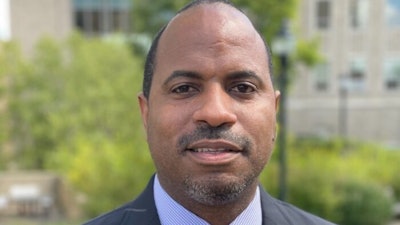The Black Men’s Research Institute (BMRI) at Morehouse College recently hosted its second spring symposium addressing Black male identities, manhood, and masculinities.
BMRI Executive Director Dr. Derrick R. Brooms noted Black male identities as both a pertinent topic for Black men’s lived experiences with a particular salience for the Morehouse community during the symposium, held at Morehouse’s Shirley A. Massey Conference Center last month.
 Dr. Derrick R. Brooms
Dr. Derrick R. Brooms
Dr. Lance Shipman Young, an associate professor of chemistry at Morehouse, delivered the keynote address about the interconnectedness of Black men’s manhood, masculinity, and health.
Young said there are scant opportunities for Black men to deal with issues of mental health.
“Our definitions of manhood are largely driven by messaging — from parents and peers to the media,” said Young. “Manhood is a mosaic construct and is a fundamentally existential experience.
“We have to be careful of minimizing feelings and emotions of Black men and the tendency to make light of their struggles and traumas,” continued Young, noting how social media posts may take Black men’s pain and hurt out of context to make light of someone else’s experiences.
Dr. Tanya Clark, an assistant professor of English at Morehouse, joined others in the conversation discussing the implications of Black male identities on Black men’s lived experiences.
“Educational institutions, specifically historically Black colleges and universities, play a huge role in helping us craft our identities and also rejecting notions of family and identity we get from larger society,” said Clark. “It is important that we celebrate our diversity and what we bring to the table through the lens of who we are. We have to understand who we are in the past, where we are in the current, and using that to push us into the future.”


















